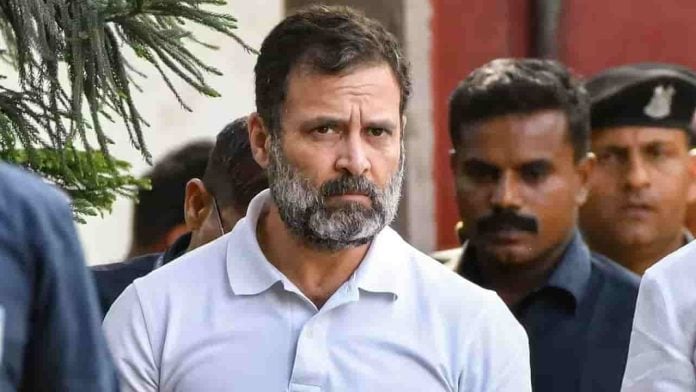Congress leader Rahul Gandhi has faced a major setback after the sessions court in Surat rejected his plea for stay on his conviction by a Magistrate court in a criminal defamation case against him.
Gandhi was convicted on March 23 by a Magistrate court in Surat for his remark “all thieves have Modi surname”.
He had made this remark during an election rally in Kolar in 2019.
Additional Sessions Judge Robin Mogera refused to stay the conviction.
This would mean that Gandhi would continue to stand disqualified from the Lok Sabha.
Before his conviction, Gandhi was the MP from Kerala’s Wayanad constituency.
Earlier on March 23, Chief Judicial Magistrate H.H. Varma in Surat had sentenced Gandhi to two years in jail, after finding him guilty under Sections 499 (Defamation) and 500 (punishment for defamation) IPC.
Judge Harish Hasmukhbhai Varma said that since Rahul was a Member of Parliament (MP), whatever he said, was bound to have a greater impact. Thus, he should have exercised restraint.
Gandhi’s conviction under Sections 499 and 500 of the Indian Penal Code (IPC), both of which warrant a maximum sentence of two years, led to his disqualification from the Parliament, as per a Supreme Court order of 2013.
He was disqualified as a Member of Parliament (MP) of the Lok Sabha on March 24 and further barred from contesting elections till 2031.
Gandhi had moved the Surat sessions court challenging his conviction, through a legal team of Senior Advocate R.S. Cheema and Advocates Kirit Panwala and Tarannum Cheema.
During the hearing today, Senior Advocate Cheema contended that as per the defamation law, only an aggrieved person could file a complaint.
Since the comment targeted Prime Minister Narendra Modi, only he could have filed a complaint.
The plea further pointed out that complainant Purnesh Modi was not an aggrieved person for the purposes of Section 499 of the Indian Penal Code (IPC), which criminalised defamation and thus, he had no right to file the complaint.
He added that the Court will have to examine whether Purnesh Modi had the locus to file the complaint.
Cheema said that the speech by Gandhi needed to be analysed contextually to ascertain whether there was any intent on part of the speaker to defame the group of persons with the surname Modi.
He argued that the speech could not be termed as defamatory unless it was drawn out of context and looked under a magnifying glass to create or to make it defamatory.
He alleged that the litigation was nothing, but an outcome of speaking up critically against Prime Minister Narendra Modi. The lawyer further said that the trial was harsh and unfair to Gandhi.
The Senior Advocate further expressed reservations about the evidence produced before the trial court and said the whole speech was not brought on record.
He noted that the speech was made on April 13, 2019 in Kolar. It was reported by the local press on April 14. A complaint was filed on April 15 and the complainant’s statements were recorded on April 16. After this and till the trial, no other evidence was brought on record, he added.
Cheema further questioned the jurisdiction of the Surat Magistrate court in trying the case when the incident in question had transpired in Kolar. The Senior Advocate noted that the defamation law in its application needed a very close and minute examination.
He further questioned the complainant’s logic in claiming that 13 crore people with Modi surname were defamed when the total population of Gujarat was just six crore.
The lawyer further asked whether everyone with ‘Modi’ surname could constitute a class. He mentioned the statement of a witness, who testified that Modi was not a caste, but Gosai is a caste and Gosai caste people were often termed as Modis.
He pointed out that Gandhi was pronounced guilty at 11:51 am on March 23 and within half an hour, he was handed over the harshest and maximum punishment. The judge had observed that since Rahul was an MP, the court wanted to send a message to the society.


